一般将来时时态用法讲解精编版
完整版一般将来时时态用法讲解

般将来时时态1. 一般将来时的定义一般将来时表示在现在看来即将要发生的动作或存在的状态。
常用时间副词tomorrow, soon 或短语n ext year / week / mon th, in a few days, in the future, sometime 做状语。
如:What will you do this afternoon ? 你今天下午干什么?We will have a meet ing tomorrow. 我们明天要开会。
He is going to study abroad (到国外) next year.明年他要出国学习。
2. 一般将来时的结构及应用(1) shall / will + 动词原形。
表示即将发生的动作或存在的状态。
特别是表示客观性的事情或在某条件下要发生的事情,只能用此结构。
如:What shall we do if he doesn '如果他不?来,我们该怎么办?Will you be free this evenin g? 今天晚上有空吗?I think he will tell us the truth (真相)。
我想他会告诉我们真实情况的。
(2) be going to +动词原形。
表示已经计划或安排好了的事情,也可表示有迹象表明肯定要发生的事情。
如:We are going to have a meeting to discuss (讨论)the matter this evening. 今天晚上开会讨论这件事情。
Look at the black clouds over there. I think it is going to rain soon. 看一看那边的乌云,我想天要下雨了。
There is going to be an En glish evening this week. 本周要举行一个英语晚会。
(3) be +现在分词。
一般将来时态精讲
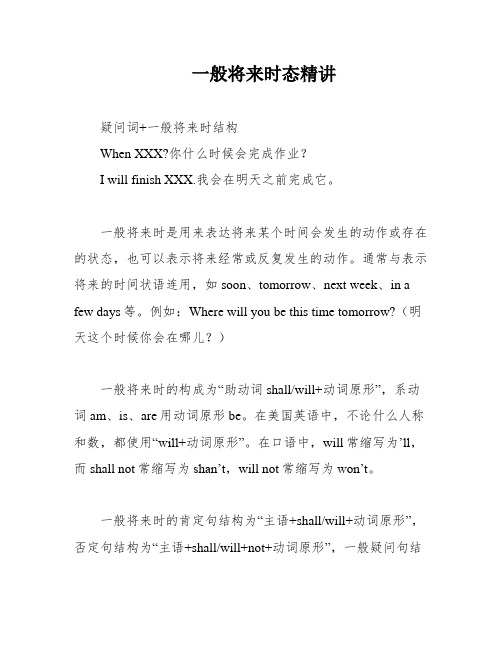
一般将来时态精讲疑问词+一般将来时结构When XXX?你什么时候会完成作业?I will finish XXX.我会在明天之前完成它。
一般将来时是用来表达将来某个时间会发生的动作或存在的状态,也可以表示将来经常或反复发生的动作。
通常与表示将来的时间状语连用,如soon、tomorrow、next week、in a few days等。
例如:Where will you be this time tomorrow?(明天这个时候你会在哪儿?)一般将来时的构成为“助动词shall/will+动词原形”,系动词am、is、are用动词原形be。
在美国英语中,不论什么人称和数,都使用“will+动词原形”。
在口语中,will常缩写为’ll,而shall not常缩写为shan’t,will not常缩写为won’t。
一般将来时的肯定句结构为“主语+shall/will+动词原形”,否定句结构为“主语+shall/will+not+动词原形”,一般疑问句结构为“Shall/Will+主语+动词原形”,特殊疑问句结构为“疑问词+一般将来时结构”。
最后,需要注意的是,shall通常用于第一人称后,由其构成的一般疑问句用来询问对方的意见,这时的shall不含将来含义,也不可被will替代。
4.There is going to be a dolphin show in the XXX.5.Are you going to be free tomorrow。
No。
I will be free the day after tomorrow.6.Mother will give me a nice present on my next birthday.7.No。
please don't.8.I will get it for you at once.9.Will there be a concert next Saturday?10.If they come。
(完整版)一般将来时基本用法
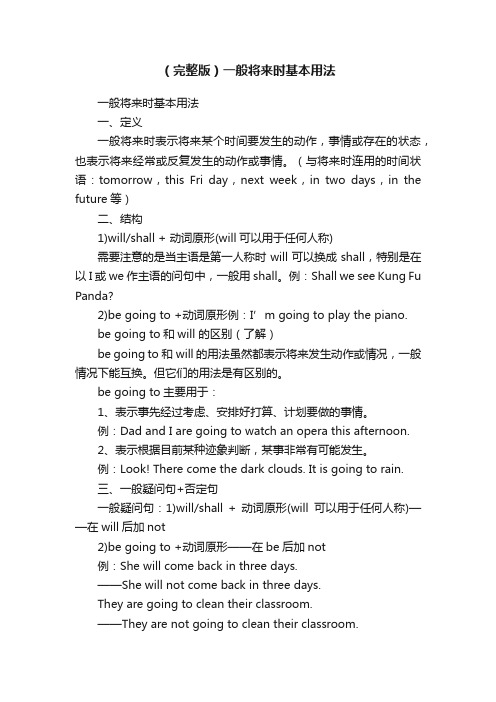
(完整版)一般将来时基本用法一般将来时基本用法一、定义一般将来时表示将来某个时间要发生的动作,事情或存在的状态,也表示将来经常或反复发生的动作或事情。
(与将来时连用的时间状语:tomorrow,this Fri day,next week,in two days,in the future等)二、结构1)will/shall + 动词原形(will可以用于任何人称)需要注意的是当主语是第一人称时will可以换成shall,特别是在以I或we作主语的问句中,一般用shall。
例:Shall we see Kung Fu Panda?2)be going to +动词原形例:I’m going to play the piano.be going to和will 的区别(了解)be going to和will 的用法虽然都表示将来发生动作或情况,一般情况下能互换。
但它们的用法是有区别的。
be going to主要用于:1、表示事先经过考虑、安排好打算、计划要做的事情。
例:Dad and I are going to watch an opera this afternoon.2、表示根据目前某种迹象判断,某事非常有可能发生。
例:Look! There come the dark clouds. It is going to rain.三、一般疑问句+否定句一般疑问句:1)will/shall + 动词原形(will可以用于任何人称)——在will后加not2)be going to +动词原形——在be后加not例:She will come back in three days.——She will not come back in three days.They are going to clean their classroom.——They are not going to clean their classroom.否定句:1)will/shall + 动词原形(will可以用于任何人称)——will 提前2)be going to +动词原形——be提前例:She will come back in three days.——Will she come back in three days?They are going to clean their classroom.——Are they going to clean their classroom?Ps:will not=won’t shall not=shan’twill可以缩写成‘ll。
动词时态一般将来时的用法

动词时态一般将来时的用法动词时态包含了多种不同的形式,每种形式都传达了特定的时间信息。
在英语中,一般将来时是用来表达将来发生的动作、事件或状态的。
本文将详细介绍一般将来时的用法,并提供一些例句来帮助读者更好地理解。
一、一般将来时的定义一般将来时是用来表达明确的将来发生的动作或状态。
通常使用的助动词是will或shall,根据主语的不同而定。
二、一般将来时的构成1. 肯定句结构:主语 + will + 动词原形例如:- I will go shopping tomorrow.- He will travel to Europe next week.2. 否定句结构:主语 + will + not + 动词原形,或主语 + won't + 动词原形例如:- She will not visit her grandparents this weekend.- They won't attend the party.3. 疑问句结构:Will + 主语 + 动词原形?例如:- Will you join us for dinner?- Will they arrive on time?三、一般将来时的用法1. 表达自愿或意愿一般将来时常常用来表达主观上的决定、打算或愿望。
例如:- I will help you with your project.- He will volunteer at the local charity organization.2. 表示未来的计划或安排一般将来时可用于描述预定的时间表或安排。
例如:- We will have a meeting at 9am tomorrow.- They will arrive at the airport in the evening.3. 表示预测或推测有时,我们可以根据现有的证据或情况,使用一般将来时来推测未来可能发生的事情。
(完整版)高中一般将来时讲解

(完整版)高中一般将来时讲解高中一般将来时讲解(完整版)一般将来时是英语语法中的一个重要时态,用来表示将来发生的动作或状态。
在高中阶段,学生需要掌握和运用一般将来时来描述将来的计划、意图、预测等。
下面我们将详细介绍高中一般将来时的使用和构成。
使用一般将来时可以用于以下几种情况:1. 表示将来的计划或安排。
例如:I will go to the beach this weekend.(我将在这个周末去海滩。
)2. 表示将来的意图。
例如:She will study medicine in college.(她打算在大学研究医学。
)3. 表示将来的预测或推测。
例如:It will rain tomorrow.(明天会下雨。
)构成一般将来时的构成非常简单,只需将"will"(shall)加在动词的原形前即可。
例如:I will study.(我将要研究。
)He will go.(他将要去。
)注意事项在使用一般将来时时,还需要注意以下几点:2. 疑问句的构成是将"will"(shall)置于句首。
例如:Will you attend the meeting?(你会参加会议吗?)3. 一般将来时通常不能用于表示固定的时间表或时间表安排,此时应使用其他时态。
例如:The train leaves at 9 a.m.(火车在上午9点离开。
)希望以上内容能够帮助你更好地理解和运用高中一般将来时。
如果还有任何问题,请随时向我提问。
一般将来时的基本结构和用法
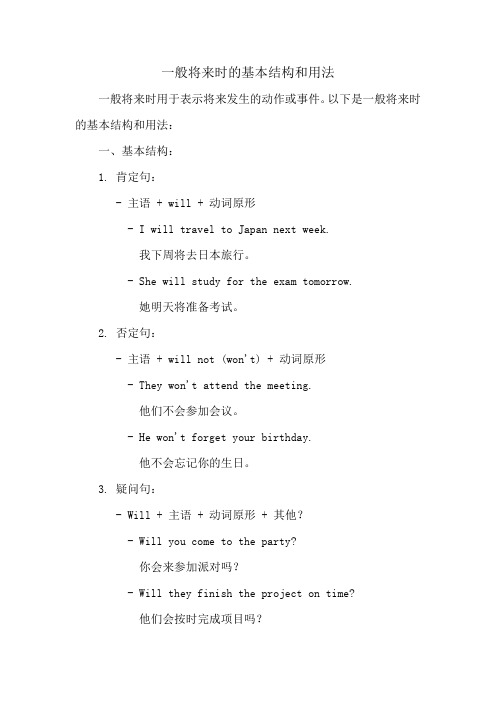
一般将来时的基本结构和用法
一般将来时用于表示将来发生的动作或事件。
以下是一般将来时的基本结构和用法:
一、基本结构:
1. 肯定句:
- 主语 + will + 动词原形
- I will travel to Japan next week.
我下周将去日本旅行。
- She will study for the exam tomorrow.
她明天将准备考试。
2. 否定句:
- 主语 + will not (won't) + 动词原形
- They won't attend the meeting.
他们不会参加会议。
- He won't forget your birthday.
他不会忘记你的生日。
3. 疑问句:
- Will + 主语 + 动词原形 + 其他?
- Will you come to the party?
你会来参加派对吗?
- Will they finish the project on time?
他们会按时完成项目吗?
二、用法:
- 表示将来发生的动作或事件。
- 表示预测、承诺、意图、计划等将来的行为或状态。
- 通常与表示将来时间的时间状语连用,如 tomorrow, next week, in the future 等。
值得注意的是,一般将来时通常用于与将来相关的动作和事件,而对于已经计划或安排好的未来事件,可以使用 "be going to" 结构。
中考英语动词时态精练解析版--一般将来时
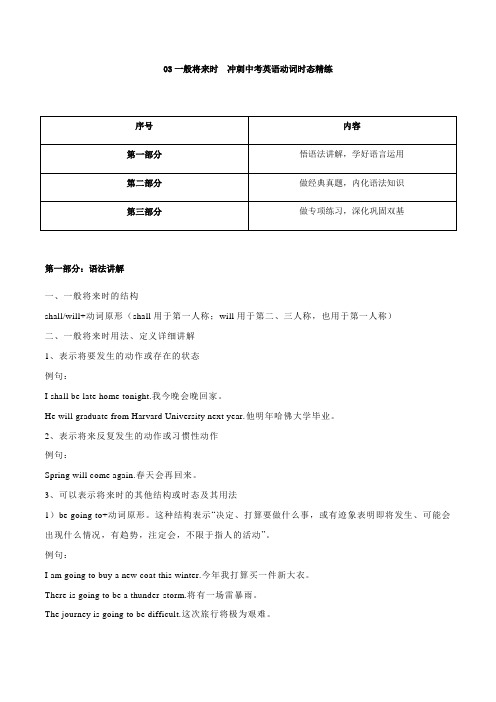
03一般将来时冲刺中考英语动词时态精练第一部分:语法讲解一、一般将来时的结构shall/will+动词原形(shall用于第一人称;will用于第二、三人称,也用于第一人称)二、一般将来时用法、定义详细讲解1、表示将要发生的动作或存在的状态例句:I shall be late home tonight.我今晚会晚回家。
He will graduate from Harvard University next year.他明年哈佛大学毕业。
2、表示将来反复发生的动作或习惯性动作例句:Spring will come again.春天会再回来。
3、可以表示将来时的其他结构或时态及其用法1)be going to+动词原形。
这种结构表示“决定、打算要做什么事,或有迹象表明即将发生、可能会出现什么情况,有趋势,注定会,不限于指人的活动”。
例句:I am going to buy a new coat this winter.今年我打算买一件新大衣。
There is going to be a thunder-storm.将有一场雷暴雨。
The journey is going to be difficult.这次旅行将极为艰难。
2)be going to和will等的比较。
①will表示说话人认为、相信、希望或假定要发生的事,不含任何具体时间,可以指遥远的将来。
而be going to指有迹象表明某事即将发生或肯定会发生,通常表示很快就要发生的事情。
例句:There is going to be a quarrel between them, I think.看来两人要发生争吵了。
He is going to get better.他的病就要好了。
②be going to和will均可表示“意图”;但事先考虑过的意图用be going to,而不是事先考虑的意图用will。
例句:A: Why have you torn the paper into pieces?B: I am going to rewrite it. (事先考虑的)A: It is a really big stone.B: I will help you to move it. (未经考虑的)3)现在进行时。
(完整版)小学一般将来时用法小结
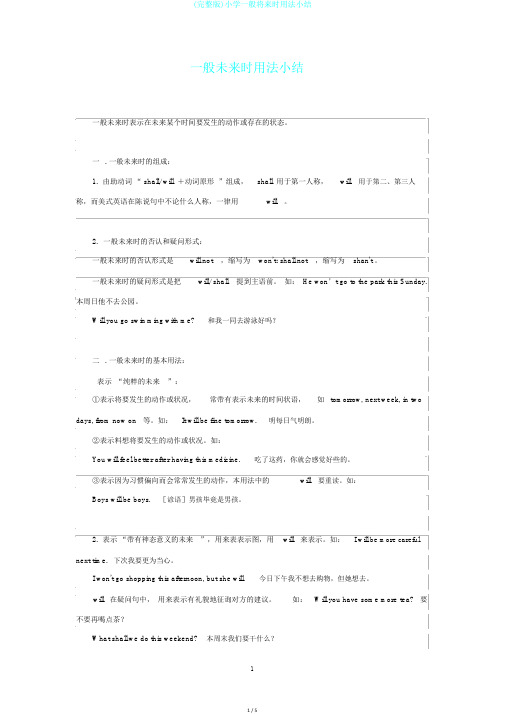
一般未来时用法小结一般未来时表示在未来某个时间要发生的动作或存在的状态。
一. 一般未来时的组成:1. 由助动词“ shall/ will +动词原形”组成,shall 用于第一人称,will用于第二、第三人称,而美式英语在陈说句中不论什么人称,一律用will。
2.一般未来时的否认和疑问形式:一般未来时的否认形式是will not,缩写为won't; shall not,缩写为shan't 。
一般未来时的疑问形式是把will/ shall提到主语前。
如:He won’t go to the park this Sunday. 本周日他不去公园。
Will you go swimming with me?和我一同去游泳好吗?二. 一般未来时的基本用法:表示“纯粹的未来”:①表示将要发生的动作或状况,常带有表示未来的时间状语,如tomorrow, next week, in two days, from now on等。
如:It will be fine tomorrow.明每日气明朗。
②表示料想将要发生的动作或状况。
如:You will feel better after having this medicine.吃了这药,你就会感觉好些的。
③表示因为习惯偏向而会常常发生的动作,本用法中的will要重读。
如:Boys will be boys.[谚语]男孩毕竟是男孩。
2. 表示“带有神态意义的未来”,用来表表示图,用will来表示。
如:I will be more careful next time.下次我要更为当心。
I won't go shopping this afternoon, but she will.今日下午我不想去购物,但她想去。
will在疑问句中,用来表示有礼貌地征询对方的建议。
如:Will you have some more tea?要不要再喝点茶?What shall we do this weekend?本周末我们要干什么?三. 一般未来时的其余几种表示法:1. 用 be going to表示:be going to相当于一个助动词,与后来的动词原形一同组成句子的谓语,表示近期将要发生的动作或存在的状态。
(完整word版)初中英语一般将来时专项语法讲解
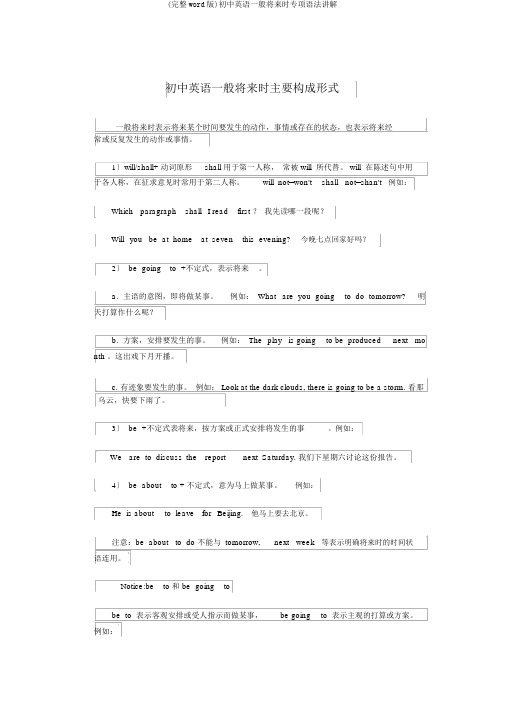
初中英语一般将来时主要构成形式一般将来时表示将来某个时间要发生的动作,事情或存在的状态,也表示将来经常或反复发生的动作或事情。
1〕will/shall+ 动词原形shall 用于第一人称,常被 will 所代替。
will 在陈述句中用于各人称,在征求意见时常用于第二人称。
will not=won't shall not=shan't例如:Which paragraph shall I read first ?我先读哪一段呢?Will you be at home at seven this evening?今晚七点回家好吗?2〕 be going to +不定式,表示将来。
a. 主语的意图,即将做某事。
例如:What are you going to do tomorrow?明天打算作什么呢?b. 方案,安排要发生的事。
例如:The play is going to be produced next mo nth 。
这出戏下月开播。
c. 有迹象要发生的事。
例如: Look at the dark clouds, there is going to be a storm. 看那乌云,快要下雨了。
3〕 be +不定式表将来,按方案或正式安排将发生的事。
例如:We are to discuss the report next Saturday. 我们下星期六讨论这份报告。
4〕 be about to + 不定式,意为马上做某事。
例如:He is about to leave for Beijing.他马上要去北京。
注意:be about to do 不能与 tomorrow, next week等表示明确将来时的时间状语连用。
Notice:be to 和 be going tobe to 表示客观安排或受人指示而做某事,be going to 表示主观的打算或方案。
例如:I am to play football tomorrow afternoon.明天下午我去踢球。
(完整版)一般将来时时态用法讲解
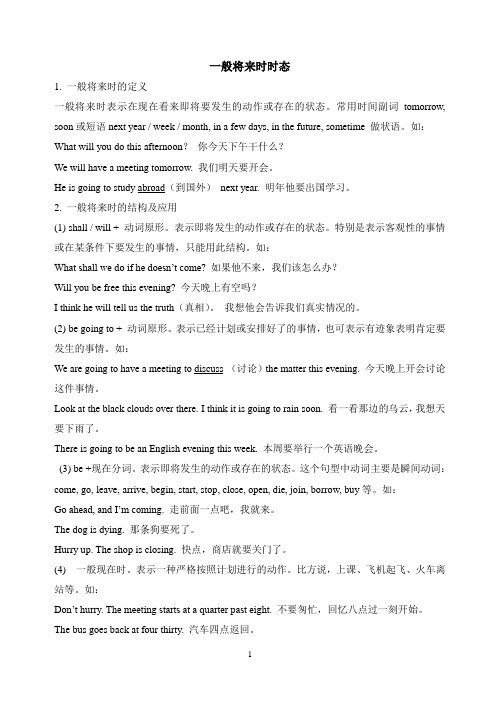
一般将来时时态1. 一般将来时的定义一般将来时表示在现在看来即将要发生的动作或存在的状态。
常用时间副词tomorrow, soon或短语next year / week / month, in a few days, in the future, sometime 做状语。
如:What will you do this afternoon?你今天下午干什么?We will have a meeting tomorrow. 我们明天要开会。
He is going to study abroad(到国外)next year. 明年他要出国学习。
2. 一般将来时的结构及应用(1) shall / will + 动词原形。
表示即将发生的动作或存在的状态。
特别是表示客观性的事情或在某条件下要发生的事情,只能用此结构。
如:What shall we do if he doesn’t come? 如果他不来,我们该怎么办?Will you be free this evening? 今天晚上有空吗?I think he will tell us the truth(真相)。
我想他会告诉我们真实情况的。
(2) be going to + 动词原形。
表示已经计划或安排好了的事情,也可表示有迹象表明肯定要发生的事情。
如:We are going to have a meeting to discuss (讨论)the matter this evening. 今天晚上开会讨论这件事情。
Look at the black clouds over there. I think it is going to rain soon. 看一看那边的乌云,我想天要下雨了。
There is going to be an English evening this week. 本周要举行一个英语晚会。
(3) be +现在分词。
表示即将发生的动作或存在的状态。
一般将来时用法总结
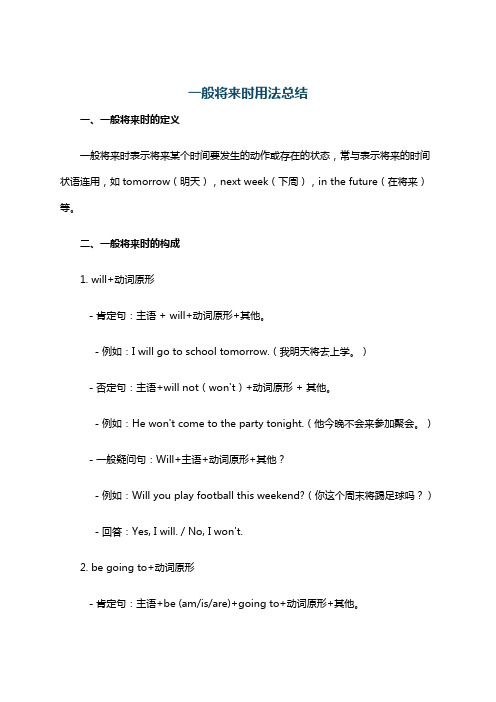
一般将来时用法总结一、一般将来时的定义一般将来时表示将来某个时间要发生的动作或存在的状态,常与表示将来的时间状语连用,如tomorrow(明天),next week(下周),in the future(在将来)等。
二、一般将来时的构成1. will+动词原形- 肯定句:主语 + will+动词原形+其他。
- 例如:I will go to school tomorrow.(我明天将去上学。
)- 否定句:主语+will not(won't)+动词原形 + 其他。
- 例如:He won't come to the party tonight.(他今晚不会来参加聚会。
) - 一般疑问句:Will+主语+动词原形+其他?- 例如:Will you play football this weekend?(你这个周末将踢足球吗?) - 回答:Yes, I will. / No, I won't.2. be going to+动词原形- 肯定句:主语+be (am/is/are)+going to+动词原形+其他。
- 例如:She is going to visit her grandparents next month.(她打算下个月去看望她的祖父母。
)- 否定句:主语+be (am/is/are)+not+going to+动词原形+其他。
- 例如:They are not going to have a meeting this afternoon.(他们今天下午不打算开会。
)- 一般疑问句:Be (am/is/are)+主语+going to+动词原形+其他?- 例如:Are you going to do your homework tonight?(你今晚打算做你的家庭作业吗?)- 回答:Yes, I am. / No, I'm not.三、一般将来时的用法1. 表示将来的计划或打算(be going to侧重于计划打算;will侧重于意愿)- I'm going to study hard this term.(我打算这个学期努力学习。
一般将来时态的结构和用法
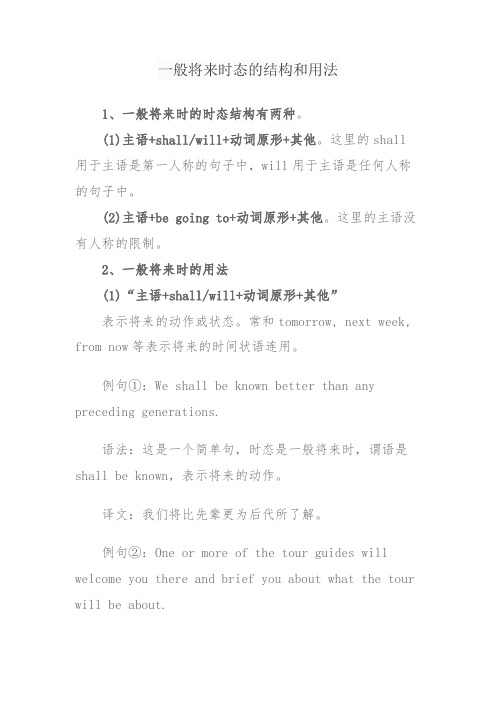
一般将来时态的结构和用法1、一般将来时的时态结构有两种。
(1)主语+shall/will+动词原形+其他。
这里的shall 用于主语是第一人称的句子中,will用于主语是任何人称的句子中。
(2)主语+be going to+动词原形+其他。
这里的主语没有人称的限制。
2、一般将来时的用法(1)“主语+shall/will+动词原形+其他”表示将来的动作或状态。
常和tomorrow, next week, from now等表示将来的时间状语连用。
例句①:We shall be known better than any preceding generations.语法:这是一个简单句,时态是一般将来时,谓语是shall be known,表示将来的动作。
译文:我们将比先辈更为后代所了解。
例句②:One or more of the tour guides will welcome you there and brief you about what the tour will be about.语法:这是一个主从复合句。
what引导的是宾语从句;主句和从句的时态都是一般将来时,谓语分别是will welcome…and brief和will be,表示将来的动作。
译文:有一个或几个导游会到那里迎接你们,并且向你们简要介绍参观的内容。
(2)“be going to+动词原形+其他”表示事先考虑过的将要发生的动作以及已有迹象表明必将要发生的某事,意为“打算,就要”。
例句:Now we go to Jane who is going to tell us about what's happening in town this weekend.语法:这是一个多重主从复合句。
who引导的是定语从句,该从句的时态是一般将来时,谓语是is going to tell;该定语从句中又包含一个由what引导的宾语从句,作介词about的宾语。
初中英语一般将来时详细讲解

初中英语一般将来时详细讲解初中英语一般将来时(Simple Future Tense)用于表示将来某个时间会发生的动作或存在的状态。
下面是初中英语一般将来时的详细讲解:一、构成:1.一般将来时的肯定句结构为:主语 + will + 动词原形2.一般将来时的否定句结构为:主语 + will not (won't) + 动词原形3.一般将来时的疑问句结构为:Will + 主语 + 动词原形?二、用法:1. 表示未来的事实、计划或打算:①I will visit my grandparents next week.(我下周会去看望我的祖父母。
)②We will have a party on Saturday.(我们周六要开个派对。
)2. 表示预测或推测:①It will rain tomorrow.(明天会下雨。
)②He will probably be late for the meeting.(他可能会迟到会议。
)3. 表示意愿、请求、建议等:①Will you please help me with my homework?(你能帮我做作业吗?)②I will do my best to help you.(我会尽力帮助你。
)4. 表示承诺或威胁:①I will always love you.(我会永远爱你。
)②If you don't listen to me, I will tell the teacher.(如果你不听我的话,我会告诉老师。
)注意事项:1. 在一般将来时中,主语通常是第一人称(I/we)或第三人称(he/she/it/they),而第二人称(you)在肯定句和否定句中都是一样的。
2. 一般将来时的疑问句需要将助动词will放在句首。
3. 在一般将来时中,表示将来时间的副词或时间状语可以与will连用,如tomorrow, next week等。
三、总结:初中英语一般将来时用于表示未来某个时间会发生的动作或存在的状态,可以用于表达事实、计划、预测、意愿、请求等。
一般将来时的结构和用法及讲解
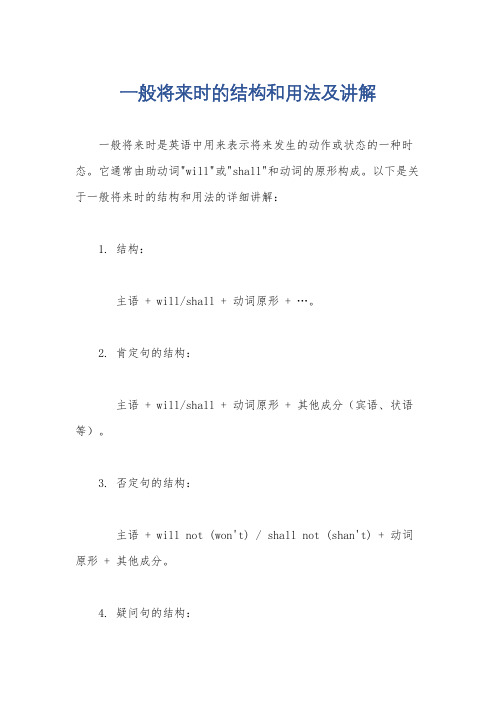
一般将来时的结构和用法及讲解一般将来时是英语中用来表示将来发生的动作或状态的一种时态。
它通常由助动词"will"或"shall"和动词的原形构成。
以下是关于一般将来时的结构和用法的详细讲解:1. 结构:主语 + will/shall + 动词原形+ …。
2. 肯定句的结构:主语 + will/shall + 动词原形 + 其他成分(宾语、状语等)。
3. 否定句的结构:主语 + will not (won't) / shall not (shan't) + 动词原形 + 其他成分。
4. 疑问句的结构:Will/Shall + 主语 + 动词原形 + 其他成分?5. 用法:a. 表示未来的事实、计划或意图,例如,“I will call you later.”(我稍后会给你打电话。
)。
b. 表示预测或假设,例如,“It will rain tomorrow.”(明天会下雨。
)。
c. 表示意愿、请求或承诺,例如,“I will help you with your homework.”(我会帮你做作业。
)。
d. 表示决定,例如,“I will buy a new car.”(我决定买辆新车。
)。
一般将来时的用法相对灵活,可以根据语境和需要进行灵活运用。
需要注意的是,一般将来时中的助动词"will"在口语中常缩写为"‘ll",而否定形式则缩写为"won't"。
同时,在一般将来时中,shall通常用于第一人称(I 和 we),而will则用于其他人称。
在现代英语中,shall的使用已经相对较少,通常用will来表示一般将来时。
(完整版)一般将来时态精讲.doc

一般将来时态精讲(一)一般将来的定一般将来表示将来某个所生的作或存在的状,也可表示将来常或反复生的作,常与表示将来的状用,如: soon, tomorrow,next week, in a few days 等。
例如: Where will you be this time tomorrow?明天个候你会在那儿?1. 表示将要生的作或存在的状。
例如 :I will return the book in a few days. 我几天会本。
2. 表示将来常或反复生的作。
例如:They will go to the park every Sunday. 他将每周日去公园。
(二)一般将来的构成一般将来由“助shall/will+原形”构成。
系am, is, are 都用原形be。
1. shall 用于第一人称后表示一般将来,一般只限于肯定句和否定句中。
shall 通常用于第一人称后,由其构成的一般疑句用来方的意,的shall 不含将来含,也不可被 will 替代。
例如:There ’ s no one to answer the phone. What shall we do?没有人接,我怎么?2. 美国英中,不什么人称和数,一律用“ will+原形”。
在口中, will 常写’,ll与主写在一起。
如: I ’ll, you ’ll, he ’ll, she ’ll, we而 shall’ll, theynot常’写ll; shan’t,will not 常写 won’t。
(三)一般将来的构1. 肯定句:主+shall\will+原形。
I shall\will work next year.明年我将要工作了。
2. 否定句:主 +shall\ will+not+ 原形。
I won ’ t tell anyone what you said.你的我不会告任何人。
3. 一般疑句: Shall\Will+ 主 +原形— Will you leave for Beijing next week? 下周你将前往北京?— Yes, I will. 是的,我将要去。
- 1、下载文档前请自行甄别文档内容的完整性,平台不提供额外的编辑、内容补充、找答案等附加服务。
- 2、"仅部分预览"的文档,不可在线预览部分如存在完整性等问题,可反馈申请退款(可完整预览的文档不适用该条件!)。
- 3、如文档侵犯您的权益,请联系客服反馈,我们会尽快为您处理(人工客服工作时间:9:00-18:30)。
一般将来时时态用法讲解公司内部编号:(GOOD-TMMT-MMUT-UUPTY-UUYY-一般将来时时态1. 一般将来时的定义一般将来时表示在现在看来即将要发生的动作或存在的状态。
常用时间副词tomorrow, soon或短语next year / week / month, in a few days, in the future, sometime 做状语。
如:What will you do this afternoon 你今天下午干什么?We will have a meeting tomorrow. 我们明天要开会。
He is going to study abroad(到国外) next year. 明年他要出国学习。
2. 一般将来时的结构及应用(1) shall / will + 动词原形。
表示即将发生的动作或存在的状态。
特别是表示客观性的事情或在某条件下要发生的事情,只能用此结构。
如:What shall we do if he doesn’t co me 如果他不来,我们该怎么办?Will you be free this evening 今天晚上有空吗?I think he will tell us the truth(真相)。
我想他会告诉我们真实情况的。
(2) be going to + 动词原形。
表示已经计划或安排好了的事情,也可表示有迹象表明肯定要发生的事情。
如:We are going to have a meeting to discuss (讨论)the matter this evening. 今天晚上开会讨论这件事情。
Look at the black clouds over there. I think it is going to rain soon. 看一看那边的乌云,我想天要下雨了。
There is going to be an English evening this week. 本周要举行一个英语晚会。
(3) be +现在分词。
表示即将发生的动作或存在的状态。
这个句型中动词主要是瞬间动词:come, go, leave, arrive, begin, start, stop, close, open, die, join, borrow, buy等。
如:Go ahead, and I’m coming. 走前面一点吧,我就来。
The dog is dying. 那条狗要死了。
Hurry up. The shop is closing. 快点,商店就要关门了。
(4) 一般现在时。
表示一种严格按照计划进行的动作。
比方说,上课、飞机起飞、火车离站等。
如:Don’t hurry. The meeting starts at a quarter past eight. 不要匆忙,回忆八点过一刻开始。
The bus goes back at four thirty. 汽车四点返回。
巩固练习:一、用所给动词的适当形式填空1.Li Lei tells me he _________________(visit)the Great Wall(长城)this weekend.2.My mother _________________(buy)me a pair of new trouserstomorrow.3.She says she _________________(leave)soon.4.We _________________(go) skating if it doesn’t rain nextSunday.5.There _________________(be)an English evening next week.6.Think over, and you _________________(get)a good idea.7.——___________Jim ___________(have)a picnic next Monday——-No, he __________.8.I _________________(miss)you after you leave here.9.Who _________________(teach)you English next year10.He _________________ (be) back in three hours.11.Look at these clouds. It ___________________ (rain).二、改错:每处划线中有错误,在题后改正1.He will sing anddancesfor us tomorrow.2.Are you going to swim ------Yes, Iwill.3.He will help Jim with his Englishevery day.4.Will her sistersingsa song for me tomorrow5.They willn’t plant trees next week.6.Are they going toplaysbasketball tomorrow7.Willwe go to visit the factory tomorrow8.Paulwill be going tomake dumplings for Emma.9.Are the boys going to the Great Wall next month ------Yes,theywill.三、句型转换:Jimis going to play footballtomorrow.Marywill clean the windowsnext week.否定句:__________________________________________________________一般疑问句:___________________________________________________________两回答:________________________________________________________特殊疑问句:___________________________________________________四、选择题( )1. —Are you going to _______ our English team —Yes, I am.A. take part inB. joinC. took part inD. joined( )2. Xu Xia and her teammates are _______ the USA next week.A. leaving forB. leave forC. leaveD. left( )3. There _______ an English party in our classnext week.A. is going to haveB. is going to beC. will haveD. Have( ) 4. If it _______ tomorrow, we will go to the park.A. isn’t rainB. don’t rainC.doesn’t rain D. won’t rain( )5. There ______ a football match next week. Shall we go and watch itA. will haveB. hasC. haveD. will be“Would you mind doing…”句型透视mind用作动词时,习惯后接动名词(短语)作宾语,而不接动词不定式,常用于Would you mind doing…句型中,具体用法是:1. “Would you mind doing…”句型常用于表示请求,意思是“请你做……你是否介意、请你做……好吗?”,是一种比较客气的表达方式。
如:Would you mind turning off the light in the room请你把房间里的灯关掉好吗如果要表示“请你不要做……你是否介意、请你不要做……好吗?”,只需要在doing前面加上not.如:Would you mind not standing in front of me请你不要站在我的前面好吗2. 如果同意,表示不介意时,可用如下用语来表达:Certainly/Of course not./Not at all./No, not at all;如果不同意,表示介意时,常用“Sorry/I‘m sorry.”(对不起)及陈述某种理由来表示拒绝或反对。
如:—Would you mind going to the movies this evening今晚去看电影好吗—I‘m sorry. But I haven’t finished my homework yet.对不起,我的作业还没有完成。
学习时还要注意:1.“Would you mind doing…”句型中的would也可用do代替,但语气较生硬,不如用would客气。
2.“Would you mind doing…”句型中的逻辑主语只能是谈话的对方you.如果想要对方允许自己做某事,可用“Would you mind my doing…”句型,如:Would you mind my smoking here你介意我在这里吸烟吗?巩固练习:一、用下面提供的短语完成句子。
1. help me wash my clothesWould you mind ______________________________2. give her a cup of teaWould you mind _______________________________3. help him mend his carDo you have _______________________________4. walk on the roadWould you mind _______________________________ on the road二、选择题( )1. —Would you mind _______ us in the game—Not at all.A. joiningB. joinC. join inD. joining in( )2. —Would you like to climb mountains with me this Sunday—I’d love to. But I _______ play table tennis against Class Three.A. am goingB. am going toC. amD. going to( )3. —Would you mind _______here—I’m sorry about that. I’ll go somewhere else.A. no smokingB. not smokingC. no smokeD. not smoke1. had better 的基本用法特点其意为“最好”、“应该”,后接动词原形,与情态动词should用法相似,其中的had通常缩略为’d:You’d better get some sleep.你最好去睡一会儿。
